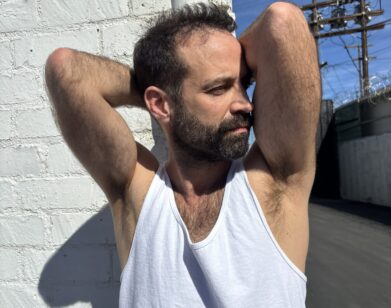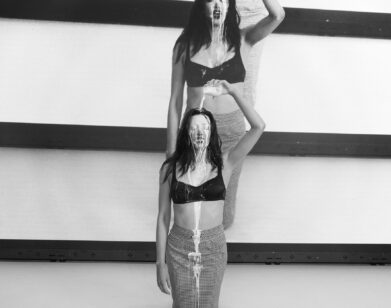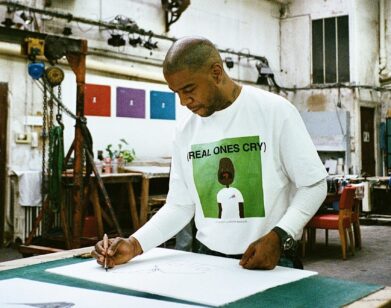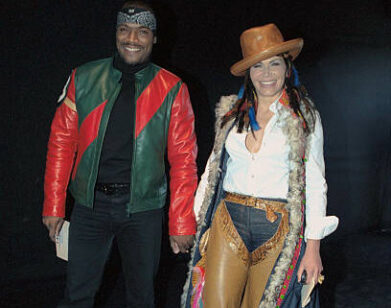New Again: Jasper Johns
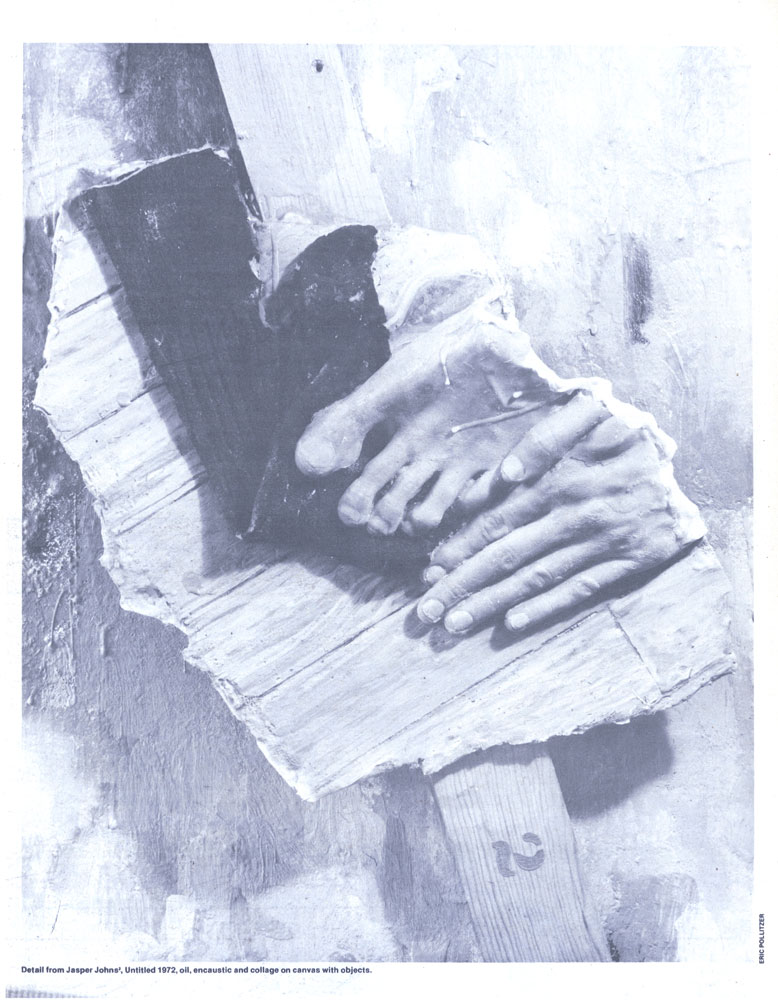
At the end of May, The Art Newspaper revealed that Jasper Johns and his eponymous foundation are behind The Other Room, a new space in Manhattan’s Meatpacking district with an inaugural exhibition featuring works by six prominent contemporary artists, such as Marianne Vitale and Andrea Longacre-White. Although the space is small (about the size of a studio apartment), its board of trustees is impressive, including artists Robert Gober, Kara Walker, and Cecily Brown.
In addition to the opening of The Other Room, new hands recently acquired one of Johns’ most influential works. The Crystal Bridges Museum of American Art bought Flag (arguably one of Johns’ most recognizable works, made in 1983) last fall for $36 million, and the painting will be on display from June 16 as part of the Arkansas museum’s permanent collection.
The American artist is a bit hard to reach these days, so here we revisit an interview from 1977, in which Johns questions almost every question posed to him.
Jasper Johns
By Philip Smith
A major retrospective of Jasper Johns painting, sculptures, drawings and prints is currently at The Whitney Museum of Art. Edited and designed by David Whitney, the exhibition has been made possible by grants from the National Endowment for the Arts and Philip Morris, Inc. After closing at the Whitney on January 22, 1978, the exhibition will travel to Cologne, Paris, London, Tokyo, and San Francisco.
PHILIP SMITH: What sorts of things are catching your eyes these days?
JASPER JOHNS: Do you mean, what ideas do I have for a painting?
SMITH: No, not at all. In going through your days do you find yourself looking at some things more often than the others?
JOHNS: No, I’ve never done that. I’ve been looking at my own work lately at the Whitney, washing it and cleaning it, much like a street cleaner or a repair man.
SMITH: Are there certain ideas that are important to you?
JOHNS: Working is very important to me. Probably because as a child I was taught that work was good. I don’t believe it intellectually but I identify with that idea. So it’s probably just like a habit.
SMITH: In what ways has art been personally important to you?
JOHNS: Art as a fantasy has been one of my earliest experiences. I suppose a lot of my childhood was a fantasy that involved getting away from things I didn’t like. Fortunately it had some relationship to reality so that later I was able to, to some extent, act as I imagined I might.
SMITH: So that now that you are where you are and you are with art, do they match up?
JOHNS: No, of course not.
SMITH: But they were supposed to, weren’t they?
JOHNS: No, nothing that’s alive matches with something that’s dead.
SMITH: But fantasies aren’t dead.
JOHNS: I’m talking about childhood and growing up. There is a difference there. You asked me how was art important to me. As a child, it was kind of a fantasy and as an activity it has been what I’ve devoted a large part of my life to. I’m grateful that the original did not lead me in a completely frustrating direction.
SMITH: What about civilization—how is art important?
JOHNS: You ask such big questions. I don’t have answers for things like that. What about civilization?
SMITH: How is art important for civilization?
JOHNS: It’s very hard to describe because I don’t know exactly what one wants when one describes importance.
SMITH: I can’t think of another word.
JOHNS: As with any sense that organizes information that with seeing has to do partly with being sensitive to some things and being insensitive to others. That’s what painting does; it organizes vision in a certain way or suggests that certain things be paid attention to and certain other things not be paid attention to. It functions in that way to a certain extent in our civilization. Whether you think that’s important or not, I don’t know. It’s important to me, it’s what I do.
SMITH: I’m asking specifically about its ability to diffuse or affect or order civilization and culture.
JOHNS: I can’t give you a result. You could think that all it did was to keep up with changes that were taking place rather than bringing change into existence.
SMITH: That’s enough, just to keep up.
JOHNS: I don’t know that is what it does, but it is a possibility. It may resist changes; that could be a function. It may smooth over. It may make disruptive things more acceptable.
SMITH: Through your process of working do you now approach the world differently?
JOHNS: I think through living one’s life, one both changes and remains the same. One can see it either way, one can see oneself as being now what one was and one can see oneself as being absolutely different from what one was. It’s a trick of thought. It’s almost just a difference of mood as to whether I would describe myself one way or the other. I think I share that experience with most people. One can think of things that have happened in one’s life. But one can also sense in oneself continuity with what one has always been since one can remember.
SMITH: In terms of ideas of oneself, in Bali when they were asked about art they said something to the effect of, “We do not have art specifically because everything we do is art.” If you were in Bali and they asked you who you are or what you do, would you describe yourself in an equivalent sense or would you differentiate between who you are and what you do?
JOHNS: You know perfectly well that we do have art and we don’t do everything as well as we can. I question whether in Bali that situation exists now. Perhaps it does. We have a very broken society. People don’t operate in that fashion. I don’t think we have that feeling of a coherent organization. I would tend to say that I do what I do as well as possible and that most people don’t.
SMITH: Are there certain things that you don’t know and would like to know or that are mysterious to you?
JOHNS: Well, I would like to know everything.
SMITH: Everything?
JOHNS: Wouldn’t you?
SMITH: I’d be scared to.
JOHNS: Well, if you knew everything it would probably end up just as one word instead of a lot of details. In terms of details I would like to know, I would like to have a large variety of factual information that I don’t have. I would like to have insights into things like government, all those big ideas that you brought up that I simply don’t have ideas about. I would like to be able to since so many people discuss them, but I don’t want to work at them. I don’t think my ambition is that strong in that direction.
SMITH: Do you have any ideas about beauty; about how it exists or what it is, where one finds it, how one finds it?
JOHNS: I think it takes many forms. It can be placed in a thing or it can be seen as a kind of activity that one is engaged in.
SMITH: So then it can be made rather than found?
JOHNS: It can be influenced, I don’t know about made.
SMITH: What sort of things or events bring you pleasure?
JOHNS: I’m at a loss to answer that.
SMITH: Nothing?
JOHNS: Well just continuity and occasional disruption of continuity. Those things give me pleasure.
SMITH: Do you think magic exists in the world?
JOHNS: In what sense?
SMITH: In the sense of magic to you?
JOHNS: I think magic is a word we use.
SMITH: To describe what?
JOHNS: As a matter of fact, I don’t think it is a word I use, but I have heard other people use it and I think I have some sense of when they use it. They usually use it when they have been touched in some way that seems dear to them and beyond normal cause and effect.
SMITH: Are there any aspects of the world that horrify you or disgust you?
JOHNS: I don’t think I can break it down into aspects. I think the whole thing is terrifying.
SMITH: Is there a way to make it less so?
JOHNS: I have no ideas.
SMITH: None?
JOHNS: I guess through persistence or endurance one might stumble upon a solution or an attitude that might be useful.
THIS INTERVIEW ORIGINALLY RAN IN THE DECEMBER 1977 ISSUE OF INTERVIEW.
New Again runs every Wednesday. For more, click here.

